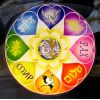Polyglotism: It may sound like a horrible disorder that affects the thyroid but actually it’s a marvellous talent – the ability to speak (and read and write) several languages. Who doesn’t dream of being able to travel to far flung destinations and converse fluently with the locals? It would be wonderful to debate the merits of the local cuisine and empathise with the trials and tribulations of the local football team without hastily flicking through a language guide and asking if the elephant likes to wear pink dresses.

Unfortunately, not many people are blessed with a skilled tongue or a mind that bends to the intricacies of foreign syntax and grammar. By the time most people decide that they want to learn another language they are way past the critical language learning age (which is typically before you hit puberty) and so they face a frustrating uphill battle.
On the other hand, some people seem to have a flair for languages, picking up words and phrases and accents with enviable ease.
But even these gifted people struggle with some languages because, all things being equal, languages are not. Some are more difficult to learn than others, especially for English-speakers and those used to the Latin alphabet. We look at three of the most difficult languages to learn – and wish you luck if you decide to give them a go.
Define difficult
First of all, what makes a language “difficult”? Difficult is, after all, very subjective. While one person struggles with Japanese, someone with an equivalent education and upbringing may coast through language classes and become a world-class interpreter. But ask those same people to speak French and the Japanese expert may flounder while the other excels.
With this is mind, the Foreign Service Institute (FSI) of the U.S. Department of State devised a system for measuring language difficulty. It considers how similar the language is to your mother tongue, it’s grammatical and syntactical complexity, the number of hours required to learn it (approximately), the resources available, and, of course, your motivation.
An interesting article on the Economist suggests that there is more to it than that. Inflection, for example, can throw a spanner in the works, sound systems can be hard to get your tongue around, and some languages assign gender to nouns.
Given these criteria, here are three of the most difficult languages to learn if English is your first language.
1) Arabic
The FSI ranks Arabic as one of the most difficult languages to learn, partly because it takes a massive 1.69 years to achieve anything approaching proficiency. This is because letters can have up to four different forms, depending on their place in the word, and verbs have many, many forms depending on the tense. According to Wang Yanfang, a verb in the present tense has 13 forms. Then there are the noun cases and genders. Throw in the number of different dialects and you’ll start to understand why English students struggle.
2) Chinese (Mandarin)
If you learn language best by mastering the written form first then you could be in serious trouble when it comes to Chinese. Yanfang says that the relationship between the spoken and written word is … tenuous. The first difficulty is that written Chinese is not even remotely phonetic, so you won’t learn anything about pronunciation. The second difficulty is that Chinese is very tonal, which means that a slight change in tone can completely change the meaning of a word.
Thirdly, it’s littered with homophones (which is where tone and context come in). Finally, according an article on O’ Pish Posh!, there are many words that simply don’t translate into English – at all.
3) Basque
Basque is a fairly obscure language which Wikipedia calls dialectally fragmented and which UNESCO considers endangered or vulnerable, In fact, it’s status as an official language is often debated. Nevertheless, according to O’ Pish Posh!, the British Foreign Office has determined that it may very well be the most difficult language that English-speakers will ever encounter.
This is because it has no syntactic parallels. Basically, Basque is as foreign as it gets. It’s also agglutinative – words are formed by joining different morphemes, usually prefixes, suffixes and infixes. According to MyLanguages.org, the beginning and the end of a verb can change depending on its use in a sentence. Verbs also often contain different versions of the subject. And then there are the 24 cases.
There are thousands of languages in the world; hundreds of thousands if you count all the different dialects (according to some estimates there are 2000 dialects in India alone). Some are more challenging than others. Precisely what makes them challenging is debatable, but if you believe Benny Lewis (from Fluent in 3 Months) the most important factor in triumphing over language is your passion. If you really, truly want to master a language and you put in the time and effort, then learning is a pleasure.
Featured images:
License: Creative Commons
image source
Jemima Winslow has tried her tongue at Russian, French and Sesotho, and none of her attempts were particularly successful. She still dreams of conquering Russian, however, would love to triumph over Mandarin and has her eye on the clicks in isiXhosa.































No Comments
Leave a comment Cancel